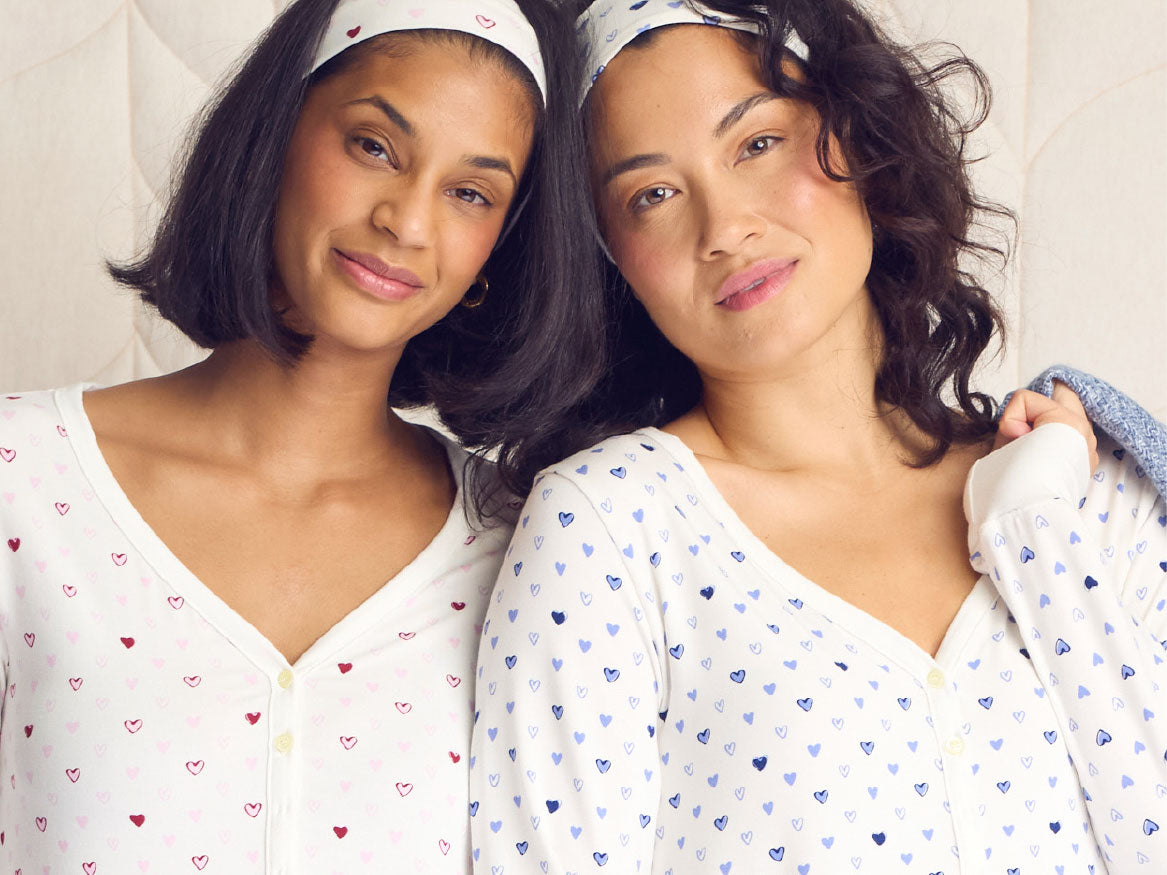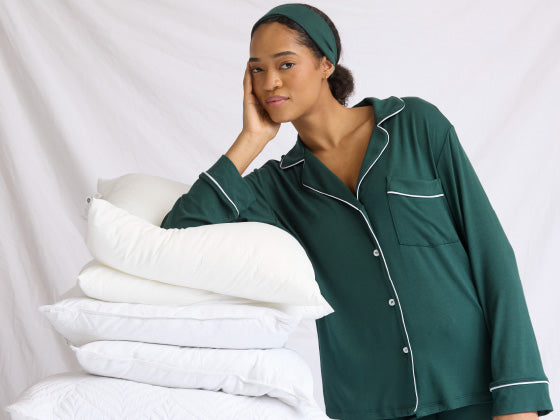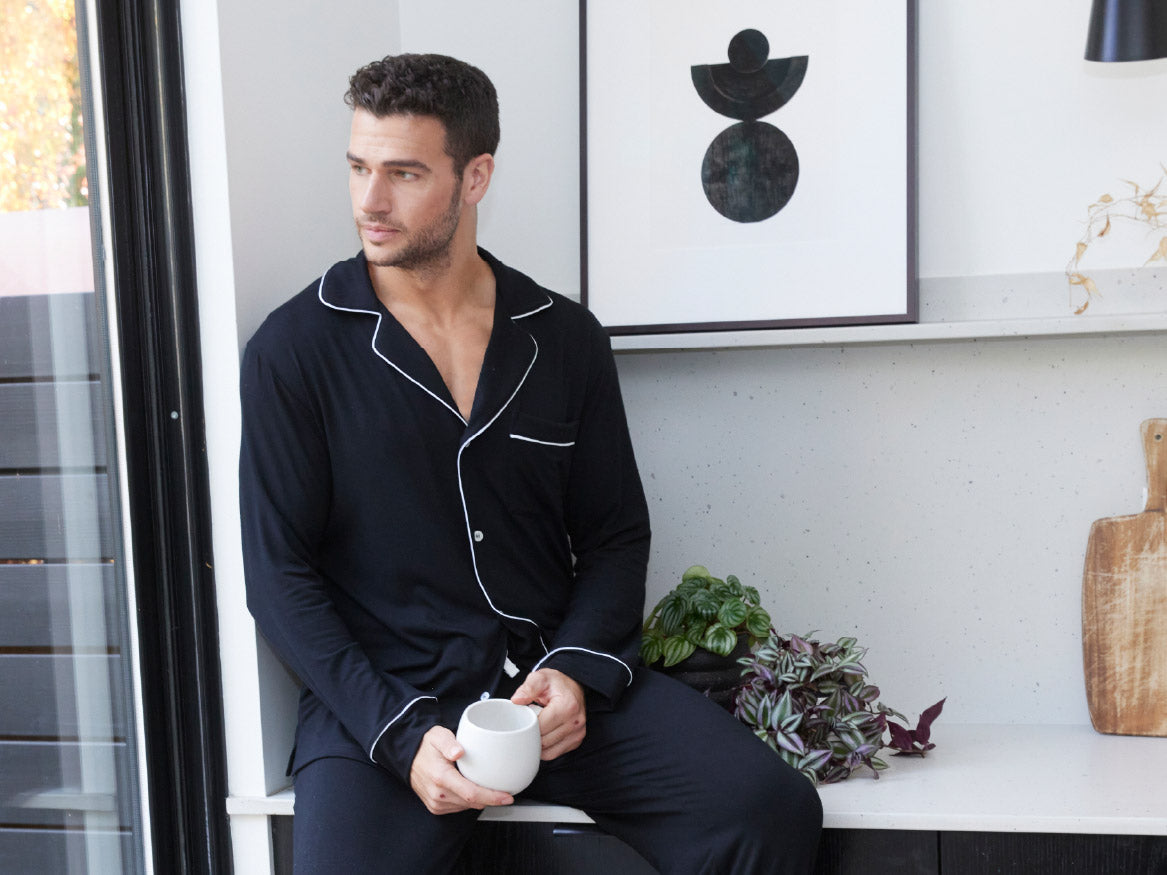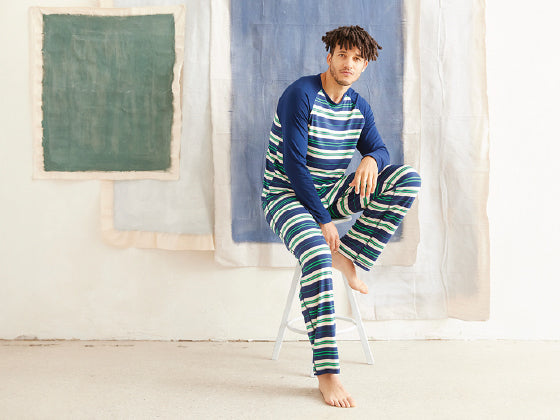Sleep matters. That's probably not news to you, as experts and news outlets have been vocal about the importance of a good night's sleep for many years. But despite the publicity, a shocking number of us are still not getting enough quality sleep, largely because we don't properly understand how much control we have over our own sleep-wake cycle.
Here at This Is J, we care about your health and comfort, especially while sleeping. So to help you sleep better, we're going to delve into the world of sleep, starting with the basics, and then moving onto many practical ways of improving sleep comfort and sleep hygiene.
Sleep: The Basics
What Is Sleep?

Sleep is a normal, necessary bodily process during which the body and brain perform a number of important functions, including:
Neuro maintenance and development. This is where the brain sorts, organizes and files information and memories gathered throughout the day. Without time to do this, the brain can quickly become overwhelmed and start to have difficulty performing simple cognitive tasks.
Energy conservation. Cells in the body need time to resupply with energy resources between periods of activity, and during sleep is the primary time for doing this.
Repair and recovery. Just as regular activity requires energy, healing injuries and recovering from illness do too. The cells in your body need extra resources when performing these tasks, and during sleep is when these resources are normally deployed. That's why you often need more sleep when you're sick.
This isn't the entire picture; sleep is still not entirely understood, and researchers are actively studying what happens to the brain during sleep. We do know a few things though, including that healthy sleep happens in stages.
What Are The Stages of Sleep?

A normal, healthy sleep period has four to five cycles of sleep, each lasting between 70 and 120 minutes, with each cycle moving through four successive stages:
Stage 1: Transitioning into sleep.
Stage 2: Light sleep.
Stage 3: Deep sleep.
Stage 4: REM sleep.
It's easiest to be woken in stages 1 and 2, as the body is slowing down and transitioning into deeper sleep; stage 3 represents when the body has slowed down significantly and has achieved a state of deep relaxation. This is when recovery begins to happen. And stage 4 is perhaps the least understood but most important stage of all, as this is when brain activity significantly increases again as REM (rapid eye movement) happens. REM sleep is the time when the brain does the majority of its important processing work.
Each cycle through these stages is not equal; during the first half of the night, people tend to spend more time in stages 2 and 3, while during the second half of the night people spend more time in stage 4, or in REM sleep. Around 25% of our total time asleep is spent in REM sleep.
During the time that you're sleeping, it's not just your brain that's changing; your entire body is too:
-
Breathing slows through stages 1-3 of sleep, reaching lowest levels in stage 3
-
Heart rate also slows according to the same pattern
-
Progressive muscle relaxation happens through stages 1-3 of sleep, while during stage 4 the majority of muscles become paralyzed (this is known as atonia, and is why we don't physically act out our dreams)
-
Hormone levels fluctuate throughout the stages of sleep
What Counts as "Good" Sleep

All of the above is necessary to understand what we mean by "good" sleep. Good sleep is measured by:
-
The ability to fall asleep (otherwise known as the length of time in stage 1)
-
The ability to stay asleep (so the body can move through the stages properly)
-
The overall duration of sleep (which equals the number of total cycles of sleep)
The good news is that all of the stages and cycles of sleep and the body's changes through sleep happen naturally, if you get a good night's sleep. But if your sleep is interrupted, if you fail to move through the stages of sleep, or if you don't get enough cycles of sleep, it can have profound effects on your body's functions.
What Happens When We Don't Get A Good Night's Sleep?

It's not dramatic to say that our entire body suffers if we don't get enough sleep. Research has shown that our cardiovascular system, immune system and metabolism are all supported by sleep, and without good sleep these systems can become compromised, sometimes significantly:
-
Sleeping less than 6 hours per night regularly increases the risk of coronary heart disease by 48%
-
Sleeping less than 5 hours per night impairs the immune system sufficiently to make a person 4.5 times more likely to catch an illness such as cold or flu
-
Sleeping less than 5 hours per night increases the risk of type 2 diabetes by 48%
-
Sleeping less than 7 hours per night results in a 41% higher risk of developing obesity
-
Chronic lack of sleep activates inflammatory signalling pathways, which over time can cause certain types of cancer and Alzheimer’s disease
As well as these significant, long-term effects, poor sleep can also result in short term issues such as impaired brain function, including worsening cognitive skills, problem-solving skills, decision-making skills, memory, and concentration; it also hampers motor skills, muscular power, reaction times and endurance, increasing the risk of injury. And not just minor injuries - 21% of car accidents are caused by lack of sleep.
So it's fair to say that a good night's rest is up there with nutrition and exercise as fundamental to your physical and mental health.
Tips To Improve Sleep Quality
The good news is that good sleep is achievable. Although research shows that Canadians on average sleep 7.9 hours per night, just shy of the recommended optimum of 8 hours, 39% say their sleep quality is poor. Getting better sleep is not rocket science though; there are some simple, practical tools and methods for improving sleep quality.
Improve Your Sleeping Environment

Perhaps one of the biggest influencers of your ability to fall asleep, and your subsequent sleep quality, is your bedroom environment and personal comfort. Many factors make up your sleep environment, including the furniture, your clothing, light levels, room temperature, and noise levels.
Room Temperature
A cool room is best for good sleep quality. Research shows that between 60 and 67 degrees Fahrenheit (or 15.5 to 19.5 degrees Celsius) is best. Overheating can make you both uncomfortable, and disrupt your sleep cycle.
Tip #1: Keep your room cool for optimal sleep.
Clothing
Room temperature and body temperature are two different things, so don't just look at your thermostat when considering bodily comfort. Loose, comfortable clothing for when you sleep will help your body temperature regulate itself.
Moisture wicking technology is good too, as this prevents you from sweating and thereby overheating or becoming uncomfortable. It also has the added benefit of being more hygienic. For more information on the best material for pajamas, take a look at this article on viscose from bamboo to see why This Is J makes so many of their luxury pajamas and sleepwear sets from this material. And to find the most comfortable, breathable, moisture-wicking sleepwear on the market, visit our online store.
Tip #2: Choose sleepwear that optimizes your comfort, while also helping you naturally regulate body temperature.
Light Levels
Unsurprisingly, a dark room is better for sleeping in. You've probably heard of your circadian rhythm - your body's internal clock - and this is heavily influenced by light levels and light temperature. The amount of light your brain detects directly changes the amount of the hormone cortisol in your blood levels, so throughout the day the amount and type of light you perceive will regulate your body's hormones and thus how tired you feel. As natural light falls, cortisol levels recede and melatonin levels increase.
To assist this process, warm, red-coloured light closer to bedtime will help your brain to understand it's time to start winding down, and decreasing light levels will do the same. Harsh, bright and bluer lights will have the opposite effect.
Tip #3: Reduce your exposure to bright light and blue light as you wind down for bed, and increase your exposure to soft, red light, before transitioning to a fully dark room for sleep. Utilize blackout curtains or a sleep mask (such as This Is J's ultra-soft sleep mask) if you need help making your room dark.
Noise Levels
Total silence is not always necessary for a good night's rest, but better sleep quality usually occurs when we're in a restful environment. Of course, this isn't always in our control. Neighbours, traffic noise, sirens and even noise from within your home can be distracting and make it harder to fall asleep and stay asleep.
Many find that some sort of white noise can help overcome these unavoidable disturbances; sleep music or other soothing music, white noise machines and fans are all good options. Earplugs are another possible solution if sudden loud noises are likely.
Tip #4: Reduce noise levels as much as possible and mask uncontrollable noise with soothing ambient sound.
Furniture and Bedding
As touched on above, the right materials can make a big difference in your body's comfort and its ability to regulate temperature and moisture. So don't just focus on sleepwear - also choose bedding that optimizes this. Bamboo or viscose from bamboo is a great choice.
Your mattress and pillow are just as important. There are no hard and fast rules about what type of mattress and pillow is best, as everyone is different. The key is to find furnishings that help your body feel supported throughout the night, without pain or discomfort or the need to move around a lot. Your weight, preferred sleep position, and comfort levels will dictate this, though of course if you share a mattress with a partner, some negotiation may be required to find a solution that works for both of you. Research shows that a mattress that better supports your personal needs can improve the quality of your sleep by up to 55%.
In terms of pillows, if you're a side sleeper, a thicker one promotes good posture, while if you sleep on your back then a thinner one will limit stress on the neck. Filling type can vary, but the only really important thing to note is that if you suffer from allergies, synthetic or hypoallergenic options are readily available to prevent allergy symptoms from interrupting your sleep.
Tip #5: Upgrade your mattress and pillow to better support your body's individual needs.
Clutter and Distractions
Did you know that a lot of clutter in your bedroom increases your chances of having a sleep disorder? What's around you affects how your brain reacts to your sleep environment. A lot of distractions will lead to distraction, and more trouble sleeping.
In a similar vein, using your bedroom and your bed for activities other than sleep and sex will program your brain not to think of it as a place for sleep, and so impact your ability to fall asleep. Most experts recommend avoiding using your phone, watching TV, working on a computer, and so on, while in bed.
Tip #6: Keep your bedroom a sanctuary for sleep; remove clutter and reserve the bed for sleep and sex.
Optimize Your Pre-Sleep State

Falling asleep isn't just a matter of lying down somewhere appropriate; good sleep hygiene begins with how we ready our bodies and minds for sleep. You can fall asleep faster, and experience better sleep quality, by taking some simple steps to prepare yourself.
Wind Down
Slowing down in the hours before sleep will significantly shorten the amount of time it takes you to fall asleep once you go to bed. This winding down can take many forms; some people have a warm bath; others perform deep breathing exercises or read a book, or listen to relaxing music.
What form your relaxation takes is not important; what is important is that you avoid tasks that make your brain feel awake or your blood pressure rise. This includes replying to emails, performing chores, exercising, taking stimulants (like caffeine or alcohol) and eating. Unplugging from electronic devices for about an hour before bed is one of the most widely known ways to help people fall asleep faster.
Tip #7: Choose a relaxing activity before going to bed to avoid inadvertently stimulating your brain into wakefulness.
Clear Your Head
Part of winding down is clearing your head. Avoiding 'thinking' activities like work and emails helps, but so does actively engaging in activities that de-stress you. It's all too easy to get caught up in a mental to do list even when not actually doing chores.
Deep breathing exercises are one common way to reduce mental activity and stress before bed. Gentle stretching is another. Bathing lowers blood pressure and can be very calming. And combining one of these activities with dimmed lighting and relaxing sounds will boost their effect.
It's also worth noting that brains used to overstimulation through the daytime - for example, if you routinely perform multiple tasks at once, constantly interrupt tasks with phone checks, and so on - have a harder time switching off at the end of the day. Avoiding overstimulation throughout the day will therefore have a positive effect on your ability to develop healthy sleep habits.
Tip #8: Find a way to de-stress and clear your mind before attempting to fall asleep.
Maintain a Routine
One of the best ways people reinforce healthy pre-bedtime habits is by creating a bedtime routine or ritual. If you perform the same restful activity every night, your body starts to anticipate its effect, and compound it. This doesn't have to be an in-depth exercise; even something as small as drinking a glass of warm milk can signal to your body it's almost time for sleep.
Tip #9: Sticking to a bedtime ritual will help you fall asleep.
Exercise at the Right Times

We all know that exercise has many health benefits, but did you know that it boosts the natural effects of the sleep hormone melatonin? Regular exercise has been clinically shown to help people sleep better, sleep more soundly through the night, and have more daytime energy. It even has these effects for those with serious sleep disorders, such as insomnia and sleep apnea.
Timing matters though, as exercising close to bedtime can have the stimulating effect of releasing epinephrine and adrenaline. Experts recommend at least 20 minutes of exercise during daylight hours; the more stimulating the exercise, the more noticeable the effects, but any exercise - even just walking - promotes sleep. Don't give up if you don't notice a difference right away, as it can take several months of regular activity before the full effects on your sleep wake cycle take root. For this reason, building healthy, sustainable exercise habits is best.
Tip #10: Regular exercise improves all aspects of sleep health; aim for a sustainable regimen during the day, and avoid working out before bed.
Control Your Exposure To Light

We've already mentioned the importance of light levels and light temperature at bedtime, but they also matter throughout the day. The body's levels of the hormones cortisol and melatonin (among others) are directly affected by exposure to light, and these have a direct impact on circadian rhythms - when you feel tired, and when you feel awake. So to optimize your circadian rhythm, you need to optimize your exposure to light.
At the most basic level, experts state that at least 30 minutes of natural light exposure a day will help you fall asleep and maintain decent sleep quality. But it goes beyond this; research shows that bright, blue light (preferably sunlight) in the morning, soon after you wake, will help your body switch into wakefulness mode. Spending time outside or in bright natural light inside during the day sustains this. Then, as you move into the evening, dimming the level and temperature of the light you are exposed to will help your body move into sleep mode. Avoid bright screens, back-lit devices and bright rooms for an hour or so before bed.
Tip #11: Aim for as much exposure to natural light throughout the day as possible, especially in the morning. Reduce your exposure to bright and blue light as you move towards bedtime.
Keep A Steady Sleep-Wake Cycle

Another big aspect of optimizing circadian rhythms is keeping to a steady schedule. Your body clock can't adjust quickly enough to inconsistent sleep-wake patterns to provide you with the quality sleep you need for good health. So to get a better night's sleep, it helps to stick to a routine.
At its core this requires you to go to sleep and wake up at roughly the same time every day. An alarm clock will help with maintaining a consistent wake up time, as do the bedtime routines we discussed above.
Sleeping in at the weekend may be attractive, but it doesn't do your sleep schedule any good. And long daytime naps can be an alluring way to pay off sleep debt, but they have the potential to completely derail sleep onset time at night. Experts advise keeping naps to no more than 20 minutes long, and just before or after lunchtime if possible. Naps later in the afternoon will cause the most damage at bedtime.
Tip #12: Try to go to sleep and wake up at the same time every day, and avoid irregular or lengthy daytime naps.
Watch Your Food Intake

The nutrition you fuel your body with also has a big effect on sleep hygiene. This manifests in several ways, some obvious, and some not so obvious:
Caffeine
It should be no surprise that caffeine can disrupt sleep quality. It's a stimulant, after all. But you may be surprised to learn that the effects of caffeine can be felt in the body up to 12 hours after ingestion - meaning that morning cup of coffee might be contributing to your poor sleep.
The absolute ideal in sleep medicine is not to have any caffeine at all, but as that's just not practical for many people, the most common recommendation is to limit caffeine to the morning. And remember that it's not just coffee that contains it - many other food items, including energy drinks, soda, tea and chocolate all contain moderate amounts of caffeine.
Tip #13: Avoid caffeinated food and drink after lunchtime.
Alcohol
Many people feel intuitively that alcohol has a sedative effect, but it actually acts as a stimulant on the body, so avoid alcohol before bedtime. Even if you think it doesn't cause you any trouble falling asleep, it has the ability to interfere with your sleep patterns, so when you wake you'll find yourself more tired. Just two servings of alcohol close to bedtime can decrease sleep quality by 39.2%.
Tip #14: Avoid alcohol before bed, even if you don't think it stops you from falling asleep.
Quantity and Type of Food and Drink
Feeling either overly full or hungry at bedtime will distract your body from its sleep schedule. For a better night's sleep, avoid big meals in the 2-3 hours before bed, and avoid rich or heavy foods that may cause heartburn when you lay down to sleep. If you're hungry in the hour before bed, have a small, low-fat snack. Similarly, drinking too many liquids before bed will lead to more interrupted sleep as you have to get up to go to the bathroom.
Sugar and refined carbohydrates can alter your body's hormone levels and affect sleep, so these are best avoided as much as possible in your regular diet. Research is still ongoing as to the best diet to promote sleep, but indications are that a diet rich in fruit, vegetables and healthy fats is best. This also happens to be the most commonly recommended diet for overall health!
Lastly, nicotine is another stimulant, so smoking close to bedtime may lead to sleep problems.
Tip #15: Don't go to bed full of either food or liquid, and watch what you eat throughout the day to avoid too many stimulants.
Understand Sleep Medicine

It's important to acknowledge that not all sleep problems can be solved by lifestyle changes. We know from the ever-developing field of sleep medicine that about 30% of Canadians suffer from a sleep disorder. These disorders can take many forms, including:
-
Insomnia (either occasional or chronic primary insomnia)
-
Sleep apnea
-
Restless legs syndrome
-
Narcolepsy
-
Circadian rhythm disorder
A sleep disorder can be physically and mentally debilitating, so if you experience any worrying symptoms, speak to a healthcare professional. Healthy adults should not routinely: take longer than 30 minutes to fall asleep, be unable to stay asleep, or sleep less than at least seven hours without external interruption. It's also a bad sign if you find yourself physically unable to stay awake or are falling asleep at a moment's notice, or if you experience difficulty breathing while asleep (a telltale sign of sleep apnea).
Clinical sleep medicine is advancing all the time and sleep medicines are available for those suffering from long term sleep deprivation caused by illness.
Tip #16: Whilst everyone can benefit from some simple lifestyle changes aimed at helping you sleep better, not all sleep problems are solvable by these methods alone. If you experience any persistent problems with your sleep, talk to a doctor.
Sleep Supplements and Sleep Aids

So now you know how important sleep is, and how you can sleep better. But you may be thinking that some of the tips mentioned above aren't achievable for you. Maybe you work nights, so rarely get any nighttime sleep. Maybe you don't have much choice about your daytime exposure to bright light. Maybe your bedroom overlooks a noisy street.
It's salient to know that many devices and products exist to help people bridge the gap between their current lifestyle and a lifestyle optimized for good sleep hygiene. This Is J has spent more than 20 years creating functional, fashionable sleepwear that puts your health and comfort first. But we're not alone; many other products exist to help you sleep better, and these include:
-
Blackout curtains or blinds
-
Lightbulbs in different hues and brightnesses
-
Blue light blocking glasses
-
Light therapy boxes
-
White noise machines
-
Earplugs
-
Alarm clocks (separate from your phone so you're not tempted to use your phone in bed)
-
Portable air purifiers
-
Dehumidifiers
-
Fans
-
Moisture-wicking, breathable pajamas and bedding
-
Hypoallergenic, synthetic and natural pillows and mattresses for optimal sleep position
-
Relaxation apps
-
Sleep aid devices
There are also sleep supplements and natural sleep aids that many people find help with their sleep. These include:
-
Melatonin
-
Magnesium
-
Nitrate
-
Omega-3
-
Resveratrol
-
Zinc
-
Valerian
-
Chamomile
-
Glycine
No single supplement will act as a magic bullet for sleep issues, but they can work in tandem with lifestyle changes toward improving sleep quality. But you should always consult with your doctor before starting any new supplement, as there may be side effects or interactions with other medications.
Melatonin supplements, for example, are one of the most commonly used supplements to help with falling asleep, but they can cause appetite changes, dizziness, drowsiness, abdominal discomfort, dry mouth, headaches, and strange dreams.
For this reason, it's wise to speak to your physician, follow their instructions carefully, stop any supplement if you notice side effects, and always start at a low dose.
One Last Piece of Advice: Keep a Sleep Journal
If you're not sure about your own sleep habits or whether you should be worried about your sleep health, try keeping a sleep journal. This will help you stay on top of how well you are sleeping, and allow you to identify factors that might be helping or hurting your sleep. This is especially useful if you are trying to identify which changes to your lifestyle are working, and which are not.













